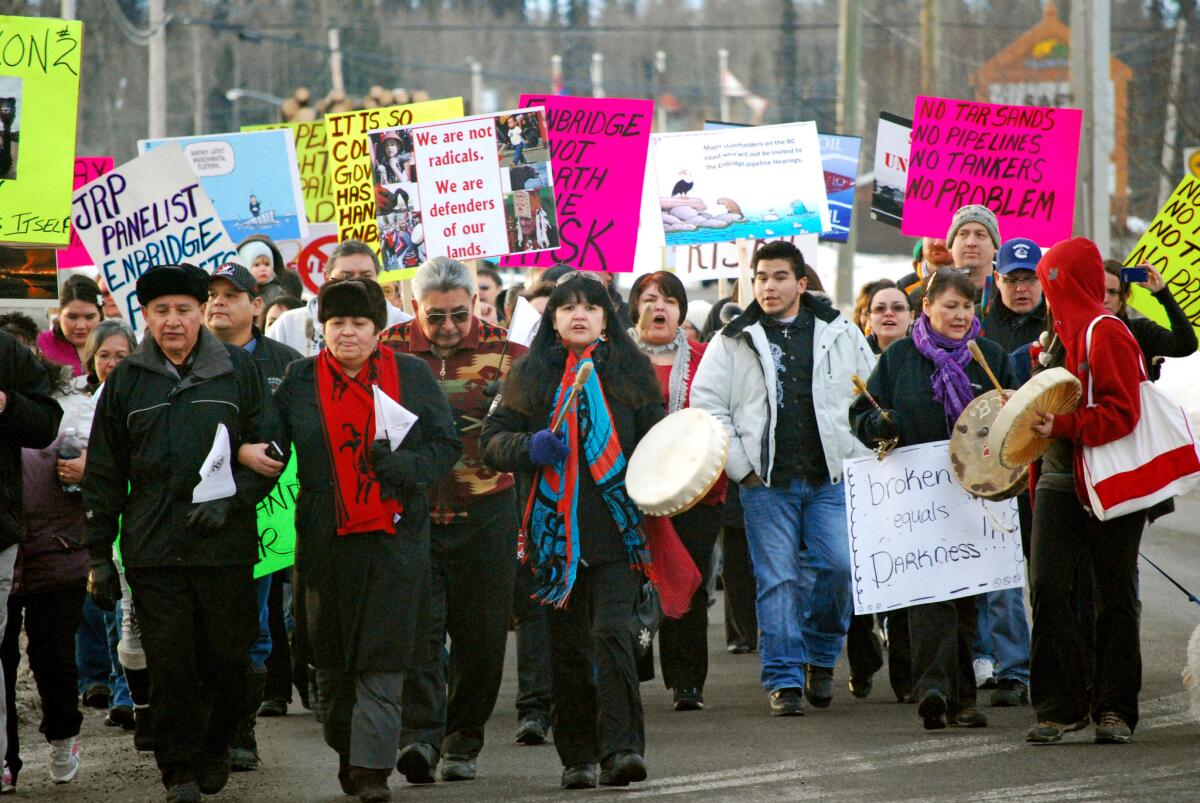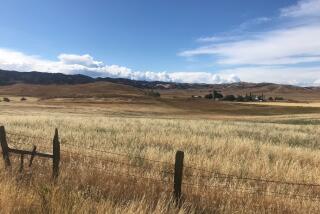Canadian government rejects pipeline through rainforests of British Columbia

Reporting from Ottawa, Canada — Canadian indigenous groups claimed victory Tuesday with Prime Minister Justin Trudeau’s rejection of the controversial Northern Gateway pipeline project, which would have carried crude oil across the wild salmon rivers and the Great Bear Rainforest of British Columbia.
The decision concluded one of the West’s most spirited environmental battles, sparked by fears that a leak near the Fraser River or an oil tanker accident in the pristine fiords off the British Columbia coast could devastate an area known for its wildness and beauty.
But Trudeau gave the green light to two other pipeline projects, Kinder Morgan’s $5-billion Trans Mountain Expansion Project, a twin pipeline running from Edmonton, Alberta, to Vancouver, and a $5.6-billion project by Enbridge Inc. to replace 1,031 miles of pipeline stretching from Alberta to Wisconsin — a project that could double the pipeline’s volume.
The Trans Mountain project, like Northern Gateway, opens the possibility of shipping Canadian tar sands oil to Asia — a plan long sought by the oil industry as markets in the U.S. dwindled, but fought by climate change activists who have warned against further reliance on fossil fuels.
Trudeau has backed limits on greenhouse gases, and announced in October that Canada will impose a tax on carbon emissions starting in 2018 as part of its efforts to meet targets set by the Paris climate change accord.
“By approving new pipelines, Prime Minister Trudeau has kicked the legs out from under Canada’s new climate change strategy,” Adam Scott of Oil Change International said in a statement.
Trudeau said his government is not wavering on these commitments with the latest pipeline approvals.
“We are able to approve pipeline projects because we have significant measures in place, including a price on carbon pollution, a world class oceans protection plan, because we’re phasing out coal, because we’re demonstrating real climate leadership,” Trudeau said at a news conference in Ottawa.
The prime minister had earlier voiced concern over running the proposed route of the Northern Gateway project through the Great Bear Rainforest, a land of mist-shrouded valleys and old-growth trees that is part of the largest intact coastal temperate rainforest on Earth.
The decision was not unexpected: Canada’s previous Conservative government had approved the project last year, but the project stalled in early 2016 when an indigenous group took the Canadian government to court, and won.
The Trudeau government could have either appealed the court ruling or complied with the decision to more adequately consult First Nations affected along the project’s route; it opted to do neither.
“This project is not in the best interest of the local affected communities, including indigenous peoples,” Trudeau said.
The two pipeline projects signaled for approval, he said, were thoroughly studied and deemed safe. “If I thought this project was unsafe for the B.C. coast, I would reject it,” Trudeau said.
One big winner from Tuesday’s announcement was Alberta, which Premier Rachel Notley said was “finally seeing some morning light” following a “long, dark night” in which the oil-rich province has been “brutally slammed by the collapse in commodity prices.”
Following a meeting with Trudeau in Ottawa, she said the two approved pipeline projects would give Alberta a chance to break its “landlock” and sell to China and other new markets at better prices. “And we’re getting a chance to reduce our dependence on one market, and therefore to be more economically independent,” Notley said.
The aboriginal group that had been one of the leaders of the fight against the Northern Gateway project – the Gitga’at First Nation, whose territory encompasses a major part of the Douglas Channel, where it would terminate – celebrated the government’s decision on that pipeline.
“All First Nations of British Columbia were opposed to Northern Gateway,” said Art Sterritt, a spokesman for and member of Gitga’at.
“We paved the way for the new federal government to actually bury the project as opposed to worrying about whether they had to revisit it,” said Sterritt. “We did all the work for them.”
Gitga’at, which spent more than a decade opposing Enbridge’s plan to build the pipeline, scored another significant victory Tuesday.
The Trudeau government announced that it would introduce legislation to implement a moratorium on crude-oil tankers along British Columbia’s northern coast, an area that extends from the province’s border with Alaska to a point close to the northern tip of Vancouver Island.
But other battles lie ahead. Pipeline operator Enbridge estimates the “Line 3” pipeline expansion will be completed by 2019, pending U.S. regulatory approval. But a coalition of First Nations groups are determined to get that project canceled in Canada before it even gets to that stage, along with Trans Mountain.
“There’s been no consent to the projects by indigenous people,” said Derek Nepinak, grand chief of the Assembly of Manitoba Chiefs.
Guly is a special correspondent.
More to Read
Sign up for Essential California
The most important California stories and recommendations in your inbox every morning.
You may occasionally receive promotional content from the Los Angeles Times.









